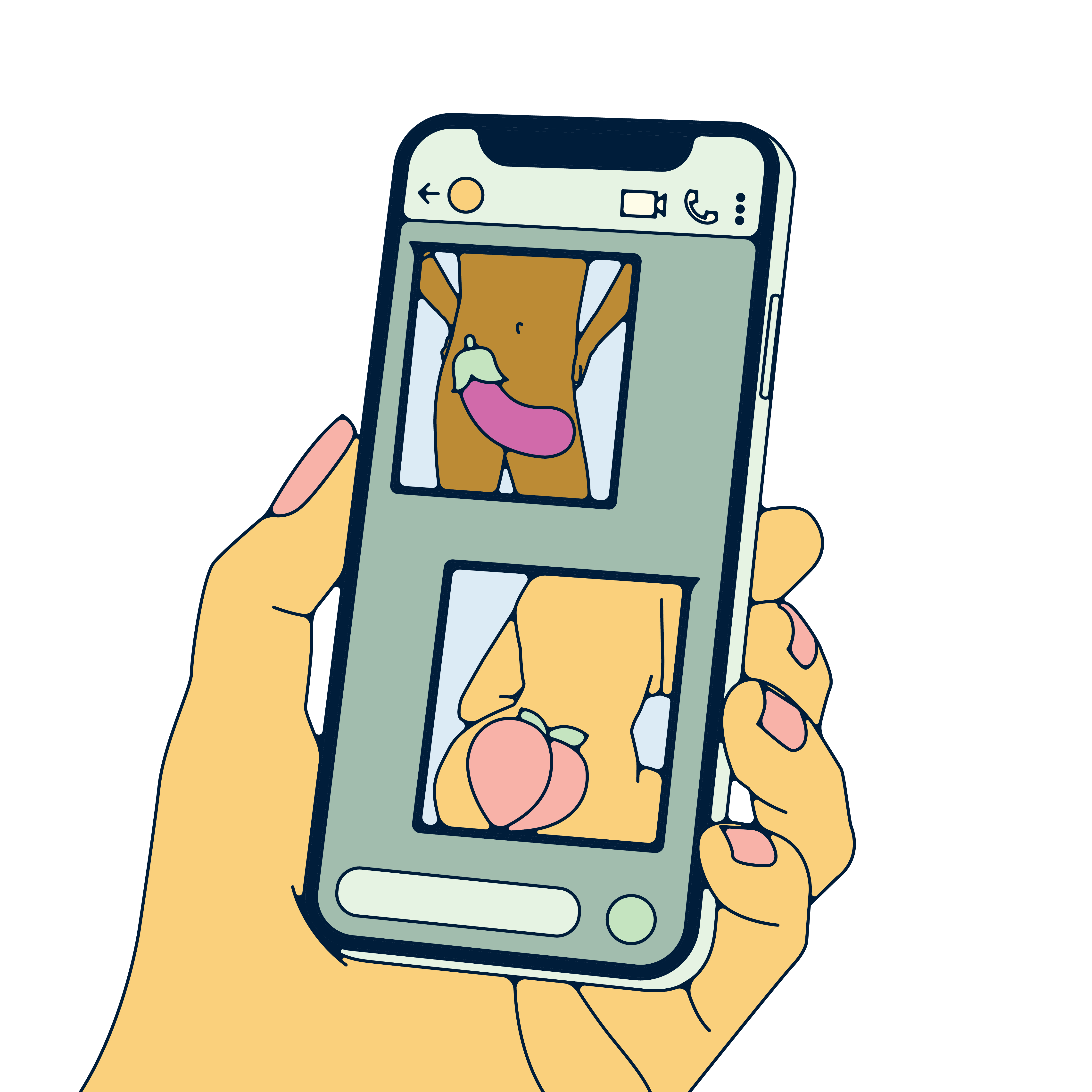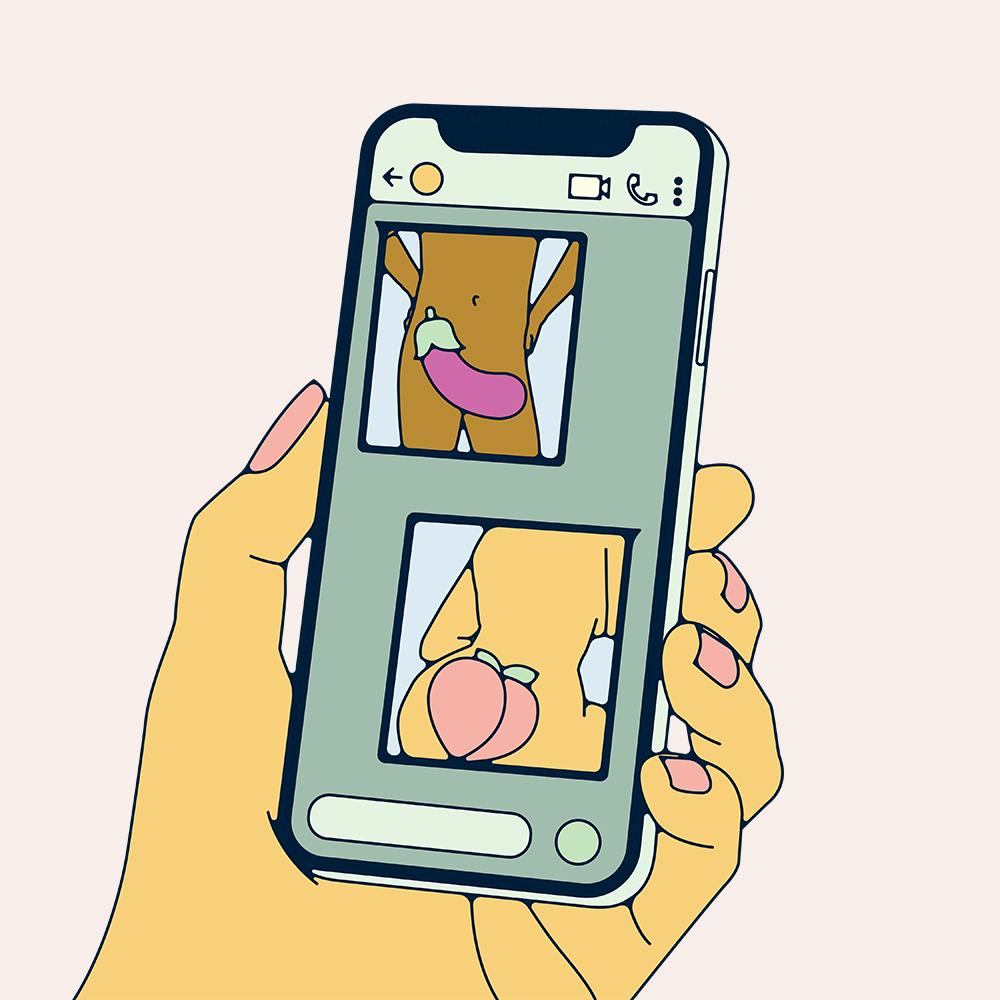Illustrated by Sabrina Bezerra
Exchanging nudes is a perfectly healthy way to explore your sexuality, and there’s nothing wrong with it when done consensually. Unfortunately though, nudes are often shared without consent – referred to as ‘revenge porn’.
In England and Wales, sharing someone's private sexual image or video without their consent (AKA ‘image based sexual abuse’) is a criminal offence punishable by up to two years in prison, but the law doesn’t offer victims much protection. In fact, saying that UK law is deficient in this area would be an understatement.
Under section 33 of the Criminal Justice and Courts Act 2015, it’s illegal to share a private sexual photograph without the consent of the person in the image, but very few cases get prosecuted, and the sentencing for this crime is often low. In 2018, only 288 people were charged with the s33 offence, and of those, only 183 were convicted.
Image based sexual abuse can damage a victim-survivor’s physical and mental health, and often even their career and personal relationships. In order to fight that, we need our health and legal systems to recognise digital intimacy as part of the definition of sexual health.
According to the World Health Organisation (WHO), sexual health is “a state of physical, emotional, mental and social well-being in relation to sexuality; it is not merely the absence of disease, dysfunction or infirmity.”
“Sexual health requires a positive and respectful approach to sexuality and sexual relationships, as well as the possibility of having pleasurable and safe sexual experiences, free of coercion, discrimination and violence.”
The WHO is promoting an expansive definition of sexual health, why wouldn’t this include digital sexual experiences, like exchanging nudes?

Issues like revenge porn and image based sexual abuse are exactly why conversations around sexual health should include digital sexual intimacy.
Nudes are often weaponised for sport, for profit, in order to humiliate or in order to intimidate – most of the time against women, at the hands of men.
Recent research by the domestic violence charity Refuge found that one in seven young women have been threatened to have their intimate photos shared without their consent. Around two-thirds of cases reported to the helpline involve women.
“The devastating impact on victims should never be underestimated,” says Sophie Mortimer, the manager of the Revenge Porn Helpline.
“This crime damages relationships, jobs and careers and harms emotional and mental health. All compounded by common victim-blaming attitudes of shame and humiliation that leave women isolated and unsupported.”
In the almost two years #NotYourPorn has been operating, we have been contacted by over a hundred adults (including sex workers) who identify as women, but only two people who identify as men. Victim-survivors have told us they feel “gaslit”, “mocked”, “humiliated” and “broken”.
This is not only because of the trauma of having their images shared without consent, but also by the way their cases have been handled by the authorities, and by the way their trauma has been addressed by health services and by their employers.
The initiative was started by Kate Isaacs in May 2019 after one of her close friends’ iCloud account was hacked. Videos of her and an ex were stolen and uploaded to Pornhub. Kate realised, in trying to get the content removed, that there was no regulation in place to hold companies like Pornhub to account for hosting non consensual content.
Weeks afterwards the video was taken down, but the damage was already done - the video was downloaded millions of times. Since 2019, #NotYourPorn has become a sex positive campaign fighting for the regulation of the commercialised porn industry to make it illegal to host and profit off non consensual content on porn websites.
But sadly, the UK Government is yet to regulate the commercialised porn industry. This is despite the crippling evidence that major players, such as Pornhub (owned by the Canadian firm MindGeek), put profit above all else. Just last year, Pornhub had to remove millions of videos after an investigation revealed a large number of them featured sex trafficking victims and children.
The protections needed for victim-survivors of image based sexual abuse, including sex workers, are incomplete without a comprehensive system of regulation of the porn industry. It isn’t anti-porn or anti-sex industry to ask for safety to be prioritised over profit.
2021 is an important time to push for change. Cases of revenge porn have surged during the pandemic, and public awareness around image-based sexual abuse has increased exponentially.
The MyImageMyChoice campaign launched a petition calling for a change to the outdated 2015 “revenge porn” law. Meanwhile Refuge has started The Naked Threat Campaign, which is striving to get the threat of sharing intimate images into the Domestic Abuse Bill.
There’s also increasing focus on the issue in Westminster. The Home Office’s consultation on Violence Against Women and Girls (VAWG) has recently been reopened and is due to close on March 26, 2021.
Any UK resident over 16 can submit a response to the survey, so this is an opportunity to for the public to lobby for image-based sexual abuse to be included in the Home Office’s VAWG 2021-2024 strategy.
If successful, there is the potential for more of the Government’s resources to be allocated to preventing and policing image based sexual abuse.
Furthermore, the Law Commission’s consultation on digital sexual abuse has recently opened its call for evidence. If you are a victim-survivor of image based sexual abuse, cyberflashing, upskirting or a number of other kinds of digital sexual abuse, the Law Commission would like to hear from you before the consultation closes on May 27, 2021.
While all these opportunities for change are positive, it is vital for both our legal system and our public health system to recognise the digital aspect of sexual health. Only then will UK citizens be protected from digital sexual abuse.
Other campaigns to support:
- MyImageMyChoice: sign the petition to change the laws on sharing private images without consent.
- Refuge’s The Naked Threat Campaign: help Refuge to get threatening to send intimate images without consent into the Domestic Abuse Bill by writing to Government ministers.
Support:
If you’ve had your images shared without your consent, you can contact The Revenge Porn Helpline, a UK-based charity which supports all UK adult victims of image-based sexual abuse, including sex workers. If you are over 18, they offer non-judgemental and confidential advice and can help with reporting and removal of content on a variety of different platforms.
The helpline is open from 10am to 4pm, Monday to Friday. Call 0345 6000 459 or email help@revengepornhelpline.org.uk.






